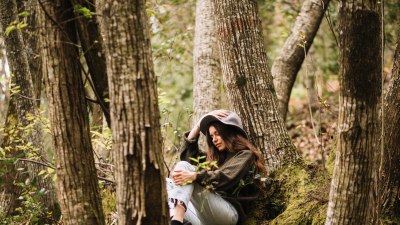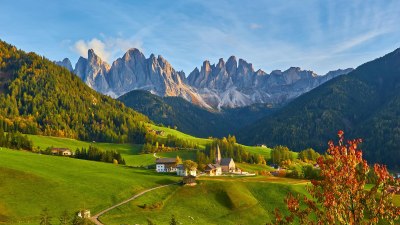Why Getting Lost in Nature Might Be the Best Trip You Ever Take
Discover the transformative power of nature and why getting lost in the outdoors can be a life-changing experience.

In the fast-paced world we live in, the allure of taking a trip into nature can be both enticing and necessary for rejuvenation. Getting lost in nature isn't just about losing your way; it's about finding yourself among towering trees, rushing rivers, and majestic mountains. This experience can be one of the most enriching adventures you can embark on. As urban living becomes increasingly prevalent, the escape into the wild can provide a much-needed breath of fresh air, a change of scenery, and an opportunity for deep reflection.
The Call of the Wild
From an evolutionary perspective, humans are wired to connect with nature. Our ancestors thrived in the great outdoors, hunting, gathering, and surviving in the wilderness. Today, despite the convenience of modern technology and urban living, the primal urges to explore, wander, and immerse ourselves in nature remain strong. When we let ourselves wander into the wild, we tap into something deep within us—a call that has echoed through generations. Getting lost, quite literally, can serve as a metaphor for getting found—not just in a physical way, but mentally and emotionally as well.
Why Getting Lost is Important
In life, it is easy to become overwhelmed by daily responsibilities, work pressures, and societal expectations. Getting lost in nature allows you the freedom to escape these obligations, even if just temporarily. This journey can have profound effects on your mental health and well-being. Studies indicate that spending time outdoors can reduce stress, decrease symptoms of anxiety and depression, and greatly enhance mood. The natural world acts as a balm for our frenetic lives and can help to recalibrate our minds and emotions.
The Joy of Disconnection
Modern lifestyles often come with a heavy reliance on technology. Continuous notifications, emails, and social media updates can create a cycle of distraction that pulls us away from the present moment. When you get lost in nature, you are afforded the chance to disconnect from the digital world. The moment you step into the great outdoors, your phone may lose signal, leaving you truly isolated. This disconnection allows for a unique opportunity to engage meaningfully with the environment around you, stimulating your senses and facilitating a deeper awareness of your surroundings.
Finding Connection
Ironically, while getting lost in nature means disconnecting from technology, it often leads to a deeper connection with both the environment and yourself. Nature has a remarkable capacity to provide experiences that foster personal growth and self-discovery. As you wander through trails lined with wildflowers or navigate rocky terrains, you may find clarity about your life's direction and purpose. The tranquility of nature offers a reflective space to think away from daily distractions, facilitating critical self-reflection.
Physical Benefits of the Wilderness
The physical benefits of spending time in nature cannot be overstated. A trek through the woods or a hike in the mountains not only provides exercise but challenges your body, enhancing fitness levels, flexibility, and strength. The varying terrains of nature, such as hills, streams, and rocks, provide a natural gym that encourages physical activity without the confines of a traditional workout. Moreover, being outdoors heightens our vitamin D levels from sun exposure, promotes better sleep, and helps strengthen the immune system.
Mindfulness and Presence
Practicing mindfulness is essential for mental well-being, and nature presents the perfect setting to cultivate this practice. The sights and sounds of the wilderness encourage you to stay present and engaged, fostering a deep appreciation for the moment. The gentle rustle of leaves, the song of birds, and the scents of pine and earth create an immersive experience that invites mindfulness. Losing yourself in nature can become an act of meditation, making you more aware of your thoughts, feelings, and surrounding environment.
Nature and Creativity
Nature has long been a source of inspiration for artists, writers, and thinkers alike. When you allow your mind to wander in the natural world, your creativity can flourish. Studies show that spending time in nature can lead to enhanced problem-solving skills and increased creativity, often referred to as the 'nature effect.' Engaging with the surroundings, such as witnessing a stunning sunset or observing the intricate patterns of leaves, can stimulate your imagination and inspire new ideas. This creativity extends beyond artistic pursuits and can permeate various aspects of your life.
Lessons From the Wilderness
Every journey into nature teaches us something unique. These lessons can range from practical skills, such as navigation and survival techniques, to deeper philosophical insights about our place in the world. Nature necessitates adaptability and resilience, as conditions can change quickly. When we get lost in nature, we learn to trust ourselves and our instincts, often leading to profound personal growth. Facing the unknown fosters courage, enhances our ability to confront challenges, and ultimately builds character.
The Natural Community
Getting lost in nature also offers the opportunity to build connections with others who share your passion for the outdoors. Whether it's joining a hiking group, a guided expedition, or simply meeting fellow travelers on the trail, forming bonds with like-minded individuals enhances the experience of being lost in nature. Sharing stories and adventures creates a sense of community that enriches your journey. These connections foster friendship, camaraderie, and support—elements that many find lacking in urban living.
Planning Your Nature Getaway
Before embarking on your adventure, it’s essential to prepare adequately. First, research potential destinations, considering factors like accessibility, terrain, and seasonal weather conditions. Once you've selected a location, gather the necessary gear, including appropriate clothing, food, water, and navigation tools. Familiarize yourself with the trail or area, but remember that part of the charm is allowing for the unexpected. Leave room in your plan for spontaneity. After all, the best adventures often stem from the unplanned experiences that occur along the way.
The Impact of Nature on Mental Health
Numerous studies highlight the positive impacts of nature exposure on mental health. Spending time outdoors has been linked to reducing symptoms associated with anxiety, depression, and stress-related disorders. Nature acts as a natural antidepressant, providing myriad psychological benefits. For those who may experience mental health challenges, getting lost in nature can serve as a therapeutic escape. The calming effects of expansive landscapes and serene surroundings make it easier to process emotions and regain a sense of balance. Combining physical activity with beautiful scenery creates a powerful antidote to many mental health struggles.
The Adventure Awaits
In essence, getting lost in nature is not merely about losing your physical sense of direction; it’s about rediscovering your sense of self and finding peace within. Through this multi-faceted experience, we regain our connection to the natural world, leading us to creativity, reflection, and growth. So, pack your bags and prepare for an adventure—your best trip might just be the one that leads you off the beaten path and into the wonders of the wild.











